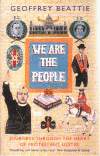We Are The People:
Journeys
through the heart of Protestant Ulster
Geoffrey Beattie. Mandarin Paperbacks ISBN
0-7493-1406-0 , £5.99
GEOFFREY BEATTIE was born and reared in the lower part of Ligoniel in North
Belfast. He passed his Eleven Plus and was educated in Belfast Royal Academy and
Trinity college, Cambridge. He is now what could be called a Guardian liberal.
His book records his return to his home after 18 years' absence in England.
Here we are forced to endure his patronising repetitions of things said to him
by taxi drivers, his mother and other innocents. He announces his shock at Bucky
the driver's pronunciation of the expletive 'bollocks' as 'baaaaalicks' "they
made that 'a' sound last forever." The same taxi driver said "My
morrrrr says I smile like John Wayne." which to Beattie sounded
"so harsh, so unloving". Presumably Bucky would also talk of his 'brorrrrr'
and 'one thing or the orrrrr'. The accent may be harsh to Beattie's tenderised
ears, but to attribute is to absence of love is sheer prejudice. Later on
Beattie reports "I could see my morrrrr as I got out of the taxi."
This isn't the worst of it. He carries on like this throughout the book.
1 also wondered about the authenticity of some of Beattie's recorded
conversations. His mother's friend Ginger, complaining that England's full of
perverts sounded just like the Uncle Andy character in Graham Reid's Billy
trilogy. The story of his Jewish schoolpal being challenged as to whether he was
a 'Protestant Jew' or a 'Catholic Jew' has been an apocryphal Ulster story for
decades.
'Patronising' is an inadequate description of Beattie. He approaches folk in
drinking clubs and interrogates them about the UDA and UVF, drug-dealing Chinese
restaurateurs, who's involved in paramilitary protection rackets etc. and seems
puzzled when he receives evasive or less than full answers. Occasionally there
are some genuine insights, such as when he sets out the views of Jack McKee, the
local Elim Pentecostal pastor, businessman Tom Pierce, the "king of ladies'
tights" and a doctor who had worked in the casualty department of the Royal
Victoria Hospital. He is at his best when he lets people speak for themselves
but he can't leave it at that. For example, he says that he always wondered
whether boils on the neck came before or after a religious conversion. He looked
closely at Pastor McKee's neck to see if he had the regulation boils. He hadn't.
Beattie always has to inject his own smart-arsed remarks somewhere. Ginger,
mentioned above, summed him up to his mother:
" 'That son of yours makes things up, to make himself seem better than
the rest of us. He's a snob all right.' 'Now, be fair, Ginger. He's not a
real stuck-up ssssnob.' 'He is.' " Ginger had a point. When Beattie's
mother, "dressed in her bargain clothes nylon everywhere - slack and top
- and her hair teased up into a Gina Lollobrigida style circa 1962...";
and uncle came to visit him in Cambridge, he wanted to "keep them out of
sight and keep them sober." He was ashamed when he was spotted with
them by his tutor. He wouldn't introduce them.
This is a story of local boy makes good and comes back to sneer and show pity
and contempt for the miserable natives he had left behind. He still has some
sense of identification with Ulster Protestants and some genuine regrets for old
friends who died or were imprisoned in the course of the troubles. But he has
been away too long. He notices things and puts a meaning on them that no-one
else would even think of and he makes sweeping generalisations from
trivialities. Up the Falls Road, "The men had moustaches. They don't up
our way." Oh really? The old mythology was that Catholics' eyes were
too close together. No-one seems to have thought of the 'moustache test' of
religious identity before! Has anyone told the FEC? At a service in Ian
Paisley's Martyrs' Memorial Church he felt hot as Paisley preached on hell but
puts it down to his attracting attention as he was trying to take notes during
the service. Anyone who has ever attended any Free Presbyterian service would
notice that many people take notes during the sermons. Beattie's own guilt and
near paranoia seem to have gotten the better of him.
One of the best bits is the poignant story of Elizabeth, a pensioner whose old
house with its backyard toilet was demolished. She was so proud of the bathroom
in her new house. This story is typical of many working class people of all
religions in Belfast in recent years.
I was less sure of his introduction of the story of the notorious Shankill
Butcher gang. He introduced this on the pretext that a taxi driver had a copy of
Martin Dillon's book in his glove compartment. Yet, Beattie met none of the gang
and the whole chapter dealing with them seemed to have been bolted on to fill a
few pages. The chapter itself was an inadequate summary of Dillon's own book.
It isn't often that I read a book through which irritates and annoys me as much as We Are The People. If you are wanting an insight into the heart of Protestant Ulster you will be disappointed if you look in here. There are books which do give an empathetic impression of Belfast and Ulster Protestants. I recommend the late Sally Belfrage's The Crack- a Belfast Year, Steve Bruce's The Red Hand and his new book At the Edge of the Union and Sarah Nelson's Ulster's Uncertain Defenders. Don't waste your money on this superficial nonsense. Far better books than this have been remaindered for fifty pence!
David Kerr
home page